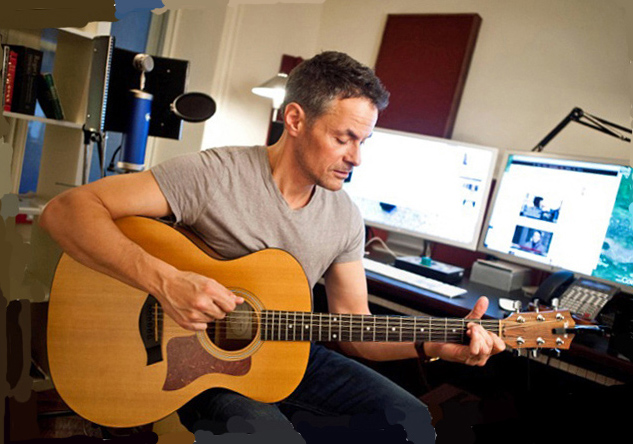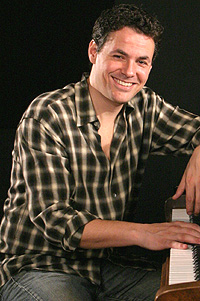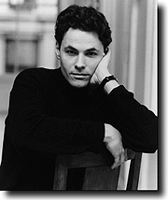
I became friendly with Adam Guettel and wrote this story in 1999. To my regret, he has produced only one theatrical musical since then. Here is a glance back, as I continue to yearn for new chords from his creative mind. — Steve Cohen
Adam Guettel stood on the brink of a great career at the dawn of the 21st century. Maybe two. He’s certain to be an important composer for the American musical theater. And possibly he could be a star performer, attracting audiences with his voice and his stage presence. He’s slender and handsome, sings gorgeously and plays four instruments.
The one thing that could stand in the way of this type of career is his modesty. Bob Hurwitz, president of Nonesuch Records, is trying to talk Guettel into making a solo CD. Faced with Guettel’s reluctance, Hurwitz tells him: “Humility can go only so far in this world.”
When Hurwitz, this writer, and 1500 other concert-goers saw Guettel (rhymes with “kettle”) on stage at Manhattan’s Town Hall on May 12, 1999, it was clear to all of us that this 34-year-old had the talent, looks and personality to achieve both of these futures. Guettel was just beginning to deal with personal fame. Hardly anyone heard of him before Floyd Collins had its premiere in Philadelphia in 1994. Even though he’s in the music business, Hurwitz admits he didn’t learn of Guettel until 1996 when Collins had a limited run at Manhattan’s Playwrights Horizons. Nonesuch then recorded the score of Floyd Collins. Hundreds more became fans when Guettel’s Myths And Hymns: Saturn Returns had a limited run at the Public Theater in 1998.
Nonesuch released the Myths and Hymns CD and word-of-mouth began to spread. Still, Adam worried that the May concert would have to be canceled because of lack of ticket sales. Town Hall is a large theater and there’s no subscription base. No display ads ran in the papers. Just a week before it, as rehearsals started, Guettel was telling friends that he’d go out for coffee with all of us who came.
On that day, May 14, the concert couldn’t start on time as fans filled the sidewalks and blocked 43d Street off Times Square. Among the throng were creative artists Arthur Laurents, Richard Maltby, Jr., Alfred Uhry and Jason Robert Brown, and performers Liza Minnelli, Michael Feinstein, Helen Hunt, Barbara Barrie and B. D. Wong. It was a distinguished crowd and this, clearly, was a major happening.
The program was two hours of music written by Guettel, almost all of it with his own lyrics. The principal singer was Guettel himself, joined by Audra McDonald, Kristin Chenoweth, Jason Danieley, Billy Porter, Jubilant Sykes, Theresa McCarthy and conductor Ted Sperling.
Guettel is the first theater composer since Harold Arlen to have a really good singing voice. Arlen had a bluesy jazz flavor in his; Guettel has more of a scat-singing jazz sound. Arlen (“Over the Rainbow,””Blues in the Night”) couldn’t compete with Bing Crosby or Perry Como in the vocal marketplace. But Guettel has a beautiful quality and the ability to negotiate ascending high scales with penetrating power. There’s no reason why he couldn’t attract crowds as effectively as Billy Joel. (And Guettel is not only a piano man; he also plays guitar, bass fiddle and electric bass.)
Here’s Guettel with only two shows behind him and — for that night, at least — he’s the hottest talent within blocks of the Great White Way. He doesn’t know yet how to deal with this. “When I started writing Myths and Hymns,” he says, “I felt I was at a crossroads in my life. I’d been a boy soprano — sang Ynold in Pelleas at the Met and Amahl at City Opera and Santa Fe Opera. Then I studied classical piano, fronted a rock band, then played upright acoustic bass in a jazz band. I was good but not great. After that I wrote some one-act operas. I knew I had talent but didn’t know what to do with it. And my 20s were somewhat dissipated. I had addictions to alcohol and drugs.”
 Just before his 29th birthday he heard about the myth that people’s lives can be changed every 29 years, when the planet Saturn returns from each of its orbits around the sun. That year he also found an 1886 Protestant hymnal in a used book store and became fascinated by the faith of the people who wrote and sang those hymns.
Just before his 29th birthday he heard about the myth that people’s lives can be changed every 29 years, when the planet Saturn returns from each of its orbits around the sun. That year he also found an 1886 Protestant hymnal in a used book store and became fascinated by the faith of the people who wrote and sang those hymns.
He says that “the very loose frame of the show was the idea of a flight from and return to the self — a journey of self-discovery.” His composition became an examination of his life, in music and words. He went through “a time of profound reassessment, asking ‘what have I done with this first cycle of my life?’ At 29 and 30 a lot of people change. I certainly did.”
The part of Myths and Hymns that explored religious faith, was something new to him. Born Jewish, he had no religious education. Today he still has no formal religion, but his quest helped him start to feel hopeful about his future. He interrupts himself to say that he was depressed but never was close to suicide. “I had enough self-awareness to know that I had talents that shouldn’t be wasted, and even during my worst periods of depression I pulled myself back from the brink.”
How did he get so messed up? He says his parents were great, “but I grew up in that affluent, hedonistic, Upper West Side culture.” His father, Henry Guettel, was a retired film executive. His mother, Mary Rodgers Guettel, was the composer of Once Upon a Mattress, as well as numerous songs and children’s stories. Mary’s father — Adam’s grandfather — was the composer Richard Rodgers. When Adam went through his reassessment at 29 he thought of the fact that Rodgers was one of the world’s most popular songwriters at that age. “I found it a little bit depressing.”
Guettel regrets that he was born too late to interact with Rodgers in his prime. Rodgers died in 1979, when Adam was 15. He still has pangs, “probably more than occasional pangs of inferiority” but he also is grateful that an inheritance from Rodgers enables him to accept jobs based on their merit, rather than a need to make money. Adam began drinking with his friends when he was a teenager. Then he added a variety of drugs. He continued that life style through four years at Yale, exerting just enough self-discipline to keep up with his work.
At Yale, Guettel won a composing competition with a concerto for jazz quartet and orchestra. Tina Landau, daughter of the late writer and director Ely Landau, was a senior at Yale when she met Guettel, two years her junior. She put together a commencement revue and asked campus composers to submit songs. Guettel came in “with a very serious, complex piece of brilliant music,” according to Landau. She and the music director agreed that Adam was a genius.
Jeanine Tesori, winner of a Drama Desk Award for composing Violet in 1997, knew Guettel during their college years. “When he was at Yale, I was at Columbia, and we both played classical piano. We met at concerts. Then we both started composing, and we’re still friends. Of course, he’s way ahead of me, because he has all that composing talent in his genes.”
But its those genes, or Adam’s thoughts about those genes, that led to some of his problems. In Myths and Hymns the 29-year-old Guettel wrote: “Icarus was not an achiever. Always resented what his father could do, Was sick and tired of the hullabaloo; When would he ever make his mark?”
He says now that he wasn’t conscious of writing about his own family, but why did he pick this particular myth? He admits to feeling pressure from the fame of his grandfather, the composer of Oklahoma!, Carousel, King and I, et al. Adam says he never resented his well-known mother. “She was my most important teacher,” he says. In fact, she was a firm critic of his writing. What parent of a bright child wouldn’t be? “She was tough on me about putting a sentence together and what a melody is supposed to be. It was constructive criticism.” And his parents had high expectations for him: “His father trusted him and took it for granted / That he would turn out to be just as enchanted.”
Throughout Myths and Hymns, Guettel writes of a search for quiet fortitude, a lighthouse on the shoreline, a taste of glory and a hope “to be the stuff that myths are made of.”
“I discovered that Greek myths and Christian hymns have a lot in common — a desire to transcend earthly bounds, to bond with something or someone greater,” Guettel explains. In his lyrics he says: “I want out of this hunger. Take me up to a higher altitude…Oh, get me up like Icarus, and give me wings like Pegasus. Just get me out and get me high!” He concludes: “Maybe faith is only hoping that we can rise anew. And so I rise and so I stand.”
Guettel’s search is set to a dizzying variety of musical styles, which makes it fun but which may pose problems for a first-time listener. This concerns him: “I want my music to be accessible.” He says he’s carrying on the tradition of melodic songwriting that started with Schubert and Schumann and continued through Stephen Foster, Victor Herbert, Jerome Kern and both Rodgerses. But there is a difference. Guettel sets his melodies against unexpected harmonies. They’re clean and open, but they’re often in a different key from the vocal melody.
Some critics have labeled his music “dissonant,” and this concerns Guettel because his songs aren’t harsh, discordant or jarring. The vocals are almost always in a major key and usually move easily up and down the scale. Having the piano or orchestral part in a different key from the vocal does create a minor dissonance, true. But that makes his songs more interesting on repeated hearings.
Because his hands are large, his accompanying chords cover a wide range. Billy Stritch says that Guettel writes “shoulder chords” — the kind that make pianists hunch their shoulders emotionally as they play. Because Guettel listens to his own voice — figuratively and literally – his songs often soar to high notes. But not always. “How Can I Lose You?” was written specifically for the moderate range of Theresa McCarthy. It’s a Tennessee-style waltz that could have been crooned by Patti Page in 1950. Very simple, very accessible…and yet Guettel asks me to listen to it again and hear a jazz trio sound in the accompaniment. What fun!
Repeatedly Guettel talks about how all the music he wrote before Floyd Collins went unheard. Then Marjorie Samoff, producing director of the American Music Theater Festival, attended a performance of an operatic version of A Christmas Carol, written by Landau and Guettel, at Trinity Rep in Providence, R.I. in 1991. She was impressed to the point of commissioning them to do Floyd Collins, based on the true story of a Kentucky cave explorer and the media circus surrounding his entrapment underground in 1925. Guettel traveled to Kentucky to research the terrain. He wanted to identify with the subject. So how did this well-educated youth from Manhattan’s Upper West Side find a bond with the uneducated Kentucky cave crawler? “Being a composer also is isolating,” he observes.
For the 1999 revision of Floyd Collins, Guettel was asked to write a new song for the title character. “The problem is that I don’t speak `Floyd’ anymore. I think I’ve lost my `Floyd’ voice.” Nevertheless, Guettel wrote the song. Then he traveled to Florence to start research on his new musical, The Light in the Piazza. With book by Alfred Uhry, it was commissioned by the Lyric Opera of Chicago for the year 2000.
“It’s a love story set in Italy, about love and the power of love. My goal is to create a special sound for that, the sound of being in love, or wanting to be.” At the Town Hall concert he premiered two melodies that he just wrote for it — still without words.
As of the year 1999, his situation can best be summed up with an exchange that occurred during the Town Hall program. Though appearing casual and relaxed on stage, Guettel was a nervous wreck. He came into the wings and said: “What do I do next?” He was, of course, referring to what’s next on the play list, but he could have been speaking about his career. Kristin Chenoweth said to him: “First, just stop and breathe.” 
Adam revealed his generosity in 2010 when the Prince Music Theater was in financial trouble and suspended operations. He asked me to phone Marjorie Samoff and say that he’d be glad to perform for her without fee to raise funds. She did not respond to my phone message.
For other stories about songwriters click here.